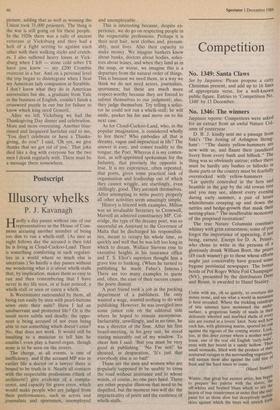Postscript
Illusory whelks
P. J. Kavanagh
Hardly a day passes without one of our representatives in the House of Com- mons accusing another member of being too dim to run a whelk-stall. (As sure as night follows day the accused is then told he is living in Cloud-Cuckoo-Land. There is something comforting in such regulari- ties in a world where so much else is uncertain.) So hardly a day passes without me wondering what it is about whelk-stalls that, by implication, makes them so easy to run and then remembering that I have never in my life seen, or at least noticed, a whelk-stall or seen or eaten a whelk.
Is Westminster surrounded by them, all being run easily by men with pearl-buttons sewn onto their suits? Have I led an unobservant and protected life? Or is the insult more subtle and deadly: the oppo- nent is being accused of not even being able to run something which doesn't exist? No, that does not work. It would still be insulting to a musician to tell him he couldn't even play a barrel-organ, though none is to be seen on the streets.
The charge, at all events, is one of inefficiency, and if the accused MP was in earlier life a doctor or a lawyer there is bound to be truth in it. Nearly all contacts with the respectable professions (think of architects!) give evidence of a compla- cence, and capacity for grave error, which would make people who are judged from their performances, such as actors and journalists and sportsmen, unemployed and unemployable.
This is interesting because, despite ex- perience, we do go on respecting people in the respectable professions. Perhaps it is their neat hair, neat clothes and, presum- ably, neat lives. Also their capacity to make money. We imagine bankers know about banks, doctors about bodies, solici- tors about leases, and when they land us in the soup, or worse, we imagine this is a departure from the natural order of things. This is because we need them, in a way we think we do not need actors, journalists, sportsmen; but these are much more respect-worthy because they are forced to submit themselves to our judgment; also, they judge themselves. Try telling a solici- tor he could not run a whelk-stall; he will smile, pocket his fee and move on to his next case.
As for Cloud-Cuckoo-Land, who, in the popular imagination, is considered wholly to live there? Who embodies all that is dreamy, vague and impractical in life? The answer is easy, and comes readily to the tongue: the Poet. Whereas it is my conten- tion, as self-appointed spokesman for the Industry, that precisely the opposite is true. It is my experience, often repeated, that poets, given some practical task of organisation and leadership out of which they cannot wriggle, are startlingly, even chillingly, good. They astonish themselves. After attempting to write poetry properly all other activities seem amazingly simple.
History is littered with examples. Milton was an invaluable Secretary to Cromwell, Marvell an admired constituency MP. Col- eridge, the type of the dreamy poet, was so successful an Assistant to the Governor of Malta that he discharged his responsibili- ties, meant to occupy his whole time, so quickly and well that he was left too long in which to dream. Wallace Stevens rose to executive heights in his insurance office and T. S. Eliot's superiors thought him a grave loss to banking. (When he turned to publishing he made Faber's famous.) There are too many examples to quote and, often, the ease of their success causes the poets dismay.
A poet friend took a job in the packing department of a publishers. He only wanted a wage, wanted nothing to do with publishing. However, he was inveigled into some junior role on the editorial side where he hoped to remain anonymous. Ineluctably, unwillingly, and in no time, he was a director of the firm. After his first board-meeting, in his grey suit, he stood staring miserably out of my window. To cheer him I said: 'But you must be very good at publishing.' No I'm not!' he shouted, in desparation, 'It's just that everybody else is so bad!'
These are the men and women who are popularly supposed to be unable to cross the road without assistance and to whose words, of course, no one pays heed. There are other popular illusions that need to be dispelled, but the moment two will do: the impracticality of poets and the existence of whelk-stalls.






















































 Previous page
Previous page